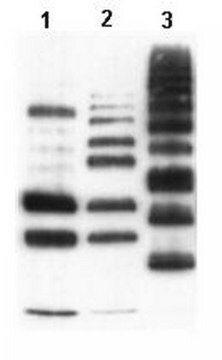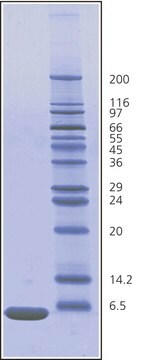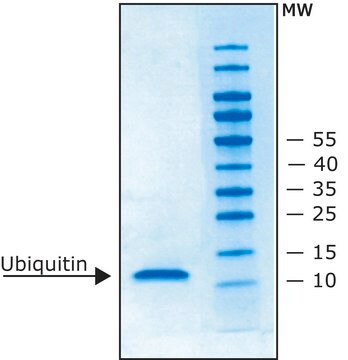Recommended Products
biological source
human
Quality Level
recombinant
expressed in E. coli (GST-tagged)
Assay
>95% (SDS-PAGE)
form
solution
mol wt
~14 kDa
application(s)
cell analysis
shipped in
dry ice
storage temp.
−70°C
Gene Information
human ... UBE2H(7328) , UBE2N(7334)
Biochem/physiol Actions
UbcH2 is the human homolog to the yeast DNA repair gene RAD6 and is inducible by DNA damaging agents. Also associated with cancer-induced cachexia and the degradation of "N-end rule" substrates. UbcH2 mRNA level in muscle has also been correlated with sepsis. Moreover, c-Jun and c-Fos transcription factors have been shown to be ubiquitinated by an UbcH2-mediated event.
UbcH2 is the human homolog to the yeast DNA repair gene RAD6 and is inducible by DNA damaging agents. Also associated with cancer-induced cachexia and the degradation of "N-end rule" substrates. UbcH2 mRNA level in muscle has also been correlated with sepsis. Moreover, c-Jun and c-Fos transcription factors have been shown to be ubiquitinated by an UbcH2-mediated event. TNF-α was shown to stimulate expression of UbcH2 in skeletal muscle cells by increasing binding of NFκ-B to the promoter region of UbcH2, inducing transcription.
Physical form
Solution in 50 mM HEPES, 50 mM NaCl, 10% glycerol, 1mM DTT, pH 7.8
Other Notes
manufactured for Sigma by Boston Biochem. Inc.
Storage Class Code
12 - Non Combustible Liquids
WGK
WGK 1
Flash Point(F)
Not applicable
Flash Point(C)
Not applicable
Certificates of Analysis (COA)
Search for Certificates of Analysis (COA) by entering the products Lot/Batch Number. Lot and Batch Numbers can be found on a product’s label following the words ‘Lot’ or ‘Batch’.
Already Own This Product?
Find documentation for the products that you have recently purchased in the Document Library.
Yi-Ping Li et al.
FASEB journal : official publication of the Federation of American Societies for Experimental Biology, 17(9), 1048-1057 (2003-05-30)
In some inflammatory diseases, TNF-alpha is thought to stimulate muscle catabolism via an NF-kappaB-dependent process that increases ubiquitin conjugation to muscle proteins. The transcriptional mechanism of this response has not been determined. Here we studied the potential role of UbcH2
Our team of scientists has experience in all areas of research including Life Science, Material Science, Chemical Synthesis, Chromatography, Analytical and many others.
Contact Technical Service








